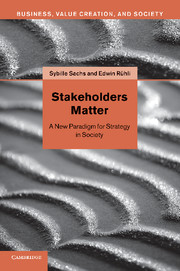Book contents
- Frontmatter
- Contents
- Figures
- Tables
- Foreword
- Acknowledgments
- 1 Challenges for a new paradigm in strategic management
- Part I Development of the basic assumptions of a new stakeholder paradigm
- Part II Our understanding of the stakeholder paradigm and its operationalization
- Epilogue
- Appendix Methodological considerations
- Glossary
- Notes
- Bibliography
- Index
Epilogue
Published online by Cambridge University Press: 07 October 2011
- Frontmatter
- Contents
- Figures
- Tables
- Foreword
- Acknowledgments
- 1 Challenges for a new paradigm in strategic management
- Part I Development of the basic assumptions of a new stakeholder paradigm
- Part II Our understanding of the stakeholder paradigm and its operationalization
- Epilogue
- Appendix Methodological considerations
- Glossary
- Notes
- Bibliography
- Index
Summary
In our book we offered an analysis of the assumptions underpinning the current approaches. This analysis emphasizes that the basic assumptions of the neoclassical economic theory, i.e. self-interest and market efficient hypothesis, are at the present time still predominant in strategy theory, and even partly in the stakeholder theory of the firm. In proposing a paradigm shift, we aim to contribute to Stiglitz’s call to reflect and revise the assumptions of the current theories, and to adapt them to the actual challenges. We suggest a shift to a stakeholder paradigm, where mutuality enhances benefits and reduces risks for the firm and its stakeholders embedded in networks, thereby leading to superior value. Superior value focuses on a continuous search by the firm and its engaged stakeholders to improve the quality of life of human beings and the sustainability of the natural world. This understanding of mutual value creation can be operationalized according to the three licenses, namely the license to operate, to innovate and to compete.
The overall basic assumption of our understanding of the stakeholder paradigm, and its operationalization in the three licenses, is that in a knowledge-based, networked society the purpose of the firm is mutual value creation with and for stakeholders. Figure E.1 shows this journey from the theory of the firm to a theory of value creation in networks, applying the principle of mutuality between firms and stakeholders in networks. In this new paradigm, it is not the invisible hand of the market that leads to an overall increase in the welfare of society, but the visible hand of the firm and the stakeholders. In other words: people work for people.
- Type
- Chapter
- Information
- Stakeholders MatterA New Paradigm for Strategy in Society, pp. 179 - 180Publisher: Cambridge University PressPrint publication year: 2011



